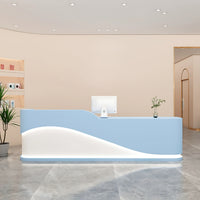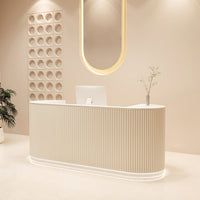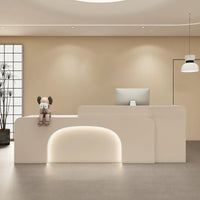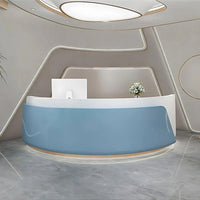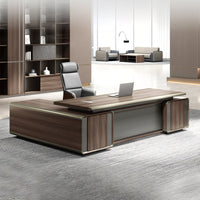How to Anchor a Reception Desk?
kaguyasuContent Menu
● Table of Contents
● Why Anchor a Reception Desk?
● Planning Your Reception Desk Installation
>> Assessing Desk Placement
>> Understanding Floor and Wall Types
● Choosing the Right Anchoring Method
>> Floor Anchoring
>> Wall Anchoring
>> Hybrid Approaches
● Tools and Materials Needed
● Step-by-Step Guide to Anchoring a Reception Desk
>> Preparation
>> Marking Anchor Points
>> Drilling and Fastening
>>> For Floor Anchoring:
>>> For Wall Anchoring:
>> Final Checks and Adjustments
● Safety and Security Considerations
● Maintenance and Inspection
● Troubleshooting Common Issues
● Frequently Asked Questions
● Article Summary
● Citations:
A reception desk is more than just a functional piece of office furniture-it is the focal point of your entryway, a symbol of your organization's professionalism, and often the first line of defense for workplace safety. Ensuring that your reception desk is properly anchored is critical for both safety and operational efficiency. This comprehensive guide will walk you through the process of anchoring a reception desk, including planning, choosing the right anchoring method, step-by-step installation, and maintenance tips. Additionally, it will address common challenges and provide answers to frequently asked questions.

Table of Contents
- Why Anchor a Reception Desk?
- Planning Your Reception Desk Installation
- Assessing Desk Placement
- Understanding Floor and Wall Types
- Choosing the Right Anchoring Method
- Floor Anchoring
- Wall Anchoring
- Hybrid Approaches
- Tools and Materials Needed
- Step-by-Step Guide to Anchoring a Reception Desk
- Preparation
- Marking Anchor Points
- Drilling and Fastening
- Final Checks and Adjustments
- Safety and Security Considerations
- Maintenance and Inspection
- Troubleshooting Common Issues
- Frequently Asked Questions
- Article Summary
- Word Count
---
Why Anchor a Reception Desk?
Anchoring a reception desk is essential for several reasons:
- Safety: Unsecured desks can tip or move, posing a risk to employees and visitors, especially in high-traffic areas or during emergencies such as earthquakes.
- Security: In modern offices, the reception desk often serves as the first line of defense against unauthorized access. Anchoring helps prevent tampering or forced entry.
- Professional Appearance: A stable, well-anchored desk maintains the integrity of your office layout and prevents unsightly shifts or misalignments.
- Durability: Proper anchoring reduces wear and tear on both the desk and the flooring, extending the lifespan of your furniture.
- Compliance: Many building codes and workplace safety standards require that large furniture items be securely anchored to prevent accidents.
---
Planning Your Reception Desk Installation
Assessing Desk Placement
Before anchoring, determine the optimal location for your reception desk. Consider:
- Visibility: The desk should be easily visible from the entrance.
- Accessibility: Ensure compliance with ADA (Americans with Disabilities Act) guidelines for accessible pathways.
- Workflow: Position the desk to facilitate efficient visitor management and security screening.
Understanding Floor and Wall Types
The type of surface you are anchoring into will dictate your approach:
- Concrete Floors: Provide the most secure base for anchoring.
- Wooden Floors: Require special anchors to avoid splitting or damaging the wood.
- Carpeted Floors: May require cutting through the carpet to reach the subfloor.
- Drywall or Masonry Walls: Each requires specific wall anchors for secure attachment.
---
Choosing the Right Anchoring Method
Floor Anchoring
This involves securing the desk directly to the floor using bolts or screws. It is the most common and secure method, especially for heavy or high-traffic desks.
Advantages:
- Maximum stability
- Prevents desk movement during impact or earthquake
Considerations:
- May require drilling into concrete or wood
- Permanent installation; moving the desk later will leave holes
Wall Anchoring
Some reception desks are designed to be anchored to the wall, especially if they are positioned against it.
Advantages:
- Less intrusive to flooring
- Suitable for lighter desks
Considerations:
- Wall must be structurally sound
- Not ideal for standalone or island desks
Hybrid Approaches
For large or security-sensitive installations, both floor and wall anchoring may be used. This provides maximum stability and security, especially in environments where the desk is a barrier for controlled access.
---
Tools and Materials Needed
Before starting, gather the following tools and materials:
- Power drill with appropriate bits (masonry, wood, or metal)
- Anchoring hardware (expansion bolts, lag screws, or wall anchors)
- Screwdrivers (Phillips and flathead)
- Rubber mallet
- Measuring tape and level
- Pencil or marker for marking anchor points
- Safety goggles and gloves
- Vacuum or broom for cleanup
---
Step-by-Step Guide to Anchoring a Reception Desk
Preparation
1. Clear the Area: Remove any obstacles or loose items from the installation area.
2. Assemble the Desk: If the desk is modular, assemble it according to the manufacturer's instructions, but do not attach the final panels or trim yet.
3. Position the Desk: Move the desk into its final position. Use a level to ensure it is even.
Marking Anchor Points
1. Identify Anchor Locations: Most desks have pre-drilled holes or brackets for anchoring. If not, choose points at the desk's base or frame that align with solid floor or wall sections.
2. Mark the Floor/Wall: Use a pencil or marker to outline where the anchors will go.
Drilling and Fastening
For Floor Anchoring:
1. Drill Pilot Holes: Using the appropriate bit, drill holes into the floor at the marked locations.
2. Insert Anchors: For concrete, use expansion bolts; for wood, use lag screws with washers.
3. Secure the Desk: Align the desk's base with the holes and fasten it tightly using a power drill or wrench.
For Wall Anchoring:
1. Locate Studs: Use a stud finder to ensure you are anchoring into solid wood or masonry, not just drywall.
2. Drill Pilot Holes: Drill holes at the marked points.
3. Insert Wall Anchors: Use heavy-duty wall anchors or toggle bolts for drywall, or masonry anchors for brick or concrete.
4. Attach Desk Brackets: Secure the desk's brackets to the wall with screws.
Final Checks and Adjustments
- Tighten All Fasteners: Ensure all bolts and screws are fully tightened.
- Install Trim and Panels: Attach any final panels or trim pieces to conceal hardware.
- Test Stability: Gently push and pull the desk to confirm it is firmly anchored.
- Clean Up: Remove dust and debris from the installation area.
---
Safety and Security Considerations
- Load Distribution: Place heavier items in the bottom drawers or shelves to lower the center of gravity and prevent tipping.
- Access Control: For security desks, integrate access control systems, such as card readers or biometric scanners, into the anchored desk.
- Bullet-Resistant Materials: In high-security environments, consider desks with bullet-resistant glass or reinforced panels.
- Emergency Planning: Ensure the anchoring does not block emergency exits or interfere with evacuation routes.
---
Maintenance and Inspection
- Regular Inspections: Check anchor points and fasteners at least twice a year for signs of loosening or corrosion.
- Tighten as Needed: Use a wrench or screwdriver to retighten any loose hardware.
- Replace Damaged Anchors: If any anchors show signs of wear or damage, replace them immediately.
- Monitor for Shifting: If the desk shifts or wobbles, recheck the anchoring and adjust as necessary.
---
Troubleshooting Common Issues
- Desk Won't Stay Level: Check that the floor is even and all anchor points are secure. Use shims if necessary.
- Anchors Won't Hold: Ensure you are using the correct type of anchor for your floor or wall material.
- Visible Hardware: Use decorative caps or trim pieces to conceal anchor bolts for a cleaner appearance.
- Difficulty Drilling: For concrete or masonry, use a hammer drill and masonry bits. For wood, pre-drill holes to prevent splitting.
---
Frequently Asked Questions
1. Can I anchor a reception desk without drilling into the floor?
Yes, wall anchoring is an alternative if the desk is positioned against a wall. For standalone desks, floor anchoring is generally more secure.
2. What type of anchors should I use for concrete floors?
Expansion bolts or wedge anchors are best for concrete, as they provide a secure hold.
3. How often should I check the anchors on my reception desk?
Inspect all anchor points at least twice a year, or more frequently in high-traffic areas.
4. Is it necessary to anchor lightweight reception desks?
Even lightweight desks should be anchored if they are in public areas or could pose a tipping hazard.
5. Can I move a desk after it has been anchored?
Yes, but you will need to remove the anchors and possibly patch holes in the floor or wall before relocating the desk.
---
Article Summary
Anchoring a reception desk is essential for safety, security, and maintaining a professional office environment. This guide covers planning, choosing the right anchoring method, step-by-step installation, and ongoing maintenance. By following these procedures, you can ensure your reception desk remains stable, secure, and visually appealing-protecting both your staff and visitors while enhancing your workplace's image.

---
Citations:
[1] https://90degreeofficefurniture.com/office-interior-design-anchoring-fact-or-fiction
[2] https://archicfurniture.com/blogs/furniture/security-reception-desk
[3] https://rework-furniture.com/blogs/think-outside-the-cubicle/should-you-anchor-your-office-furniture
[4] https://www.tayco.com/wp-content/uploads/2022/11/Reception-Station-installation-guide_1122.pdf
[5] https://www.youtube.com/watch?v=9Z5__leUjfE
[6] https://www.consumerreports.org/home-garden/furniture-anti-tip-straps/best-furniture-anchor-kits-to-prevent-furniture-tip-overs-a7254542377/
[7] https://www.reddit.com/r/Carpentry/comments/14bq3r2/how_do_i_remove_these_type_of_screws_on_a_office/
[8] https://www.yarooms.com/blog/elevate-your-front-desk-safety-security-top-recommendations
[9] https://archicfurniture.com/blogs/furniture/diy-receptionist-desk
[10] https://www.ais-inc.com/files/Reception_Products_Installation_Instructions_C-CRPINSTRUCT.pdf
[11] https://www.consumerreports.org/home-garden/furniture/how-to-anchor-furniture-to-help-prevent-tip-overs-a4328328212/
[12] https://www.dgicommunications.com/reception-desk-table-area-design/
[13] https://www.tssbulletproof.com/blog/best-practices-for-reception-area-security
[14] https://kaguyasu.com/blogs/blog/how-to-build-a-reception-desk-1
[15] https://www.youtube.com/watch?v=Tiekmwju8bU
[16] https://www.cpsc.gov/s3fs-public/pdfs/Tipover-Prevention-Project-Anchors-without-Tools.pdf
[17] https://www.reddit.com/r/askhotels/comments/1js78wa/looking_for_advice_on_choosing_a_reception_desk/
[18] https://www.thebuildingcodeforum.com/forum/threads/outlet-on-reception-desk.28795/
[19] https://www.youtube.com/watch?v=H3rjeum_UY8
[20] https://visit-us.com/the-perfect-reception-desk-for-your-business/
---
Hot Tags: China, Global, OEM, private label, manufacturers, factory, suppliers, manufacturing company
